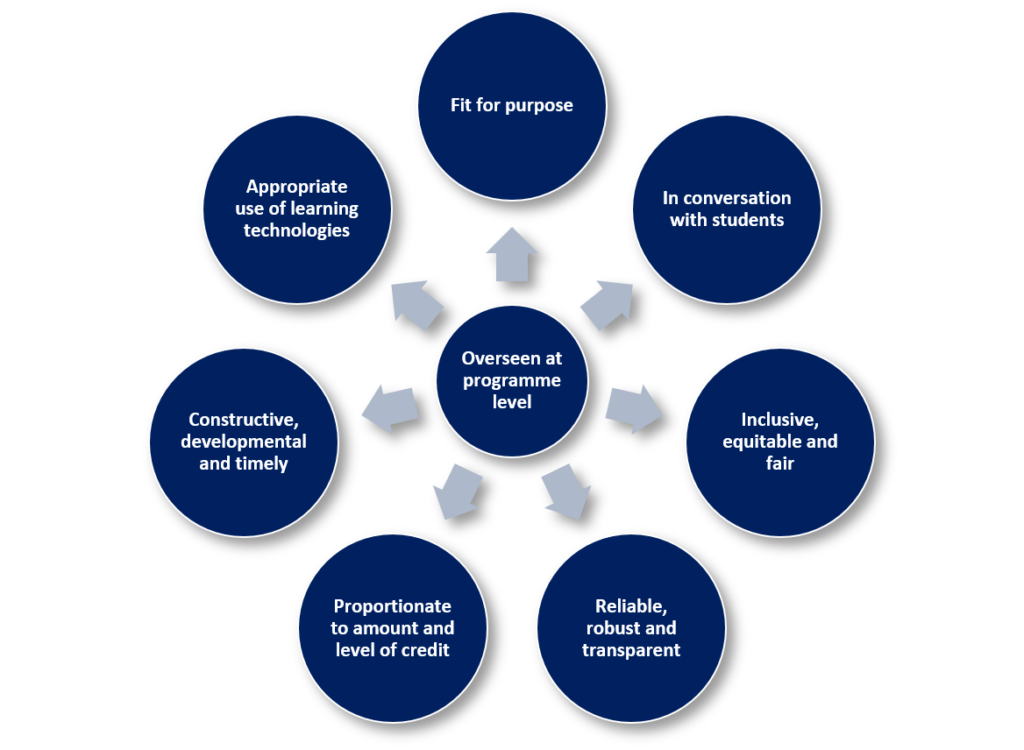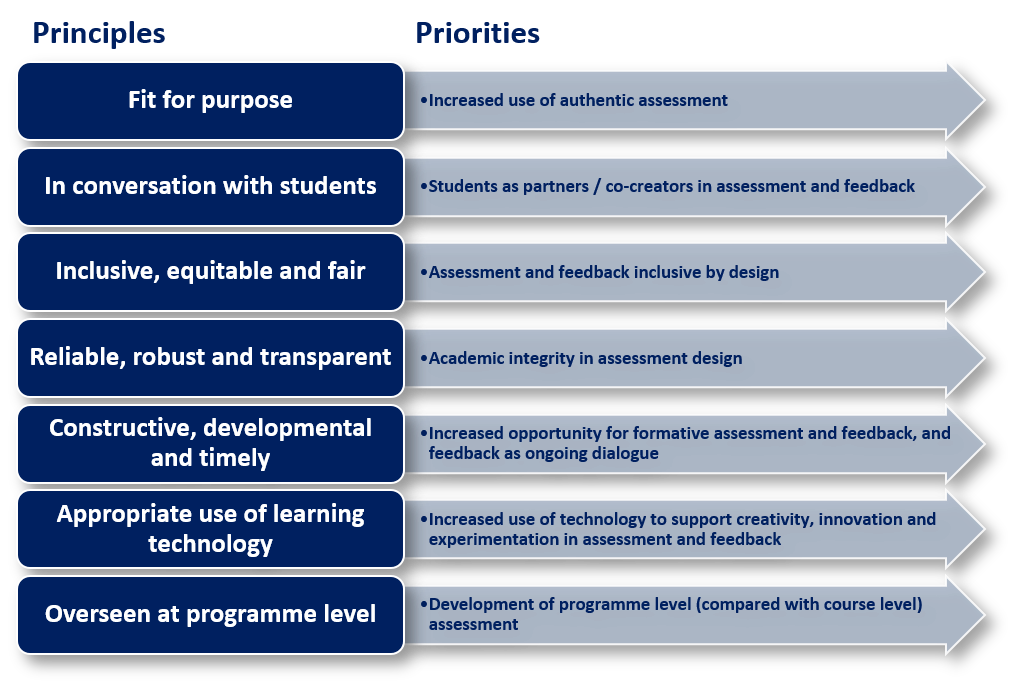
In this blog post, Professor Tina Harrison provides an overview of the principles and priorities and why they were introduced. Tina is Assistant Principal Academic Standards and Quality Assurance. This is the first in a series of eight blog posts focusing on the recently developed Assessment and Feedback Principles and Priorities, which constitutes the Learning and Teaching Enhancement Theme for July & August.
It is fair to say that we have not performed well in the National Student Survey (NSS) when it comes to assessment and feedback, despite many positive reports from external examiners. Our Enhancement-led Institutional Review (ELIR), that took place towards the end of last academic year, recognised that assessment and feedback remained an ongoing challenge and made the following recommendation:
The University is asked to make demonstrable progress, within the next academic year, in prioritising the development of a holistic and strategic approach to the design and management of assessment and feedback.
To address this recommendation, and put an approach in place by the start of the next academic year (2022/23), a Task Group of the Curriculum Transformation Programme was set up, co-led by Tina Harrison and Sabine Rolle (Dean of Undergraduate Education, CAHSS). Following extensive research, benchmarking and consultation, the Task Group proposed a holistic and strategic approach to assessment and feedback comprising assessment and feedback principles that set out the baseline expectations, assessment and feedback priorities that give strategic direction for ongoing enhancement (and align with Curriculum Transformation), and support and guidance for both staff and students.
The assessment and feedback principles and priorities form a new framework for reviewing and guiding assessment and feedback practice, and will sit alongside the taught assessment regulations to be rolled out from academic year 2022/23. The following seven blog posts in this series will explore each of the principles and associated priorities in further detail, but here’s a brief overview.
Our assessment will be fit for purpose
Assessment is an integral part of learning and teaching and has many purposes, including being for and of learning. We need to be clear about the purpose of assessment, and ensure that the assessment methods are fit for that purpose. Assessments should prepare students to become practitioners in their discipline/field as well as aligning with the Edinburgh Student Vision for Curriculum Transformation. Our priority is to encourage greater use of authentic assessment providing opportunity for students to perform real-life tasks or explore activities/issues/problems encountered by professionals, citizens, or consumers. Traditional exams and essays have their place, but should not be the default option.
Our assessment and feedback practices will involve conversation with students
One of the key criticisms from students in the NSS is that the expectations for assessment are not always clear. Ongoing conversation with students about assessment can develop a shared understanding of the purpose of assessment, assessment expectations and marking criteria. Students need to be supported to undertake assessments and to develop assessment and feedback literacy. Our priority is for colleagues to work more closely with students as partners or co-creators in assessment and feedback practices, involving students in decision-making and moving beyond assessment as something that is done to students to something that is done with them.
Our assessment and feedback will be inclusive, equitable and fair
When designing assessments it is important to take account of diverse student learning needs and approaches and, as far as possible, minimise the need for individual learning adjustments. The main priority here is for assessments to be inclusive by design. Where this may not be possible in a single assessment method, offering choice to students can overcome this. Students should have the opportunity to experience a range of assessments across their programme. We also need to be mindful of the role of assessment in contributing to progression and awarding gaps, and review and revise assessment approaches accordingly.
Our assessment and feedback will be reliable, robust, and transparent
Another criticism of students in the NSS is that it is not always clear how marks have been awarded, giving rise to comments about ‘unclear’, ‘unfair’, and ‘subjective’ marking. It is important that marking criteria are clear to students and made available with the assessment task. The use of marking rubrics is helpful here. Assessment design should also support and encourage good academic practices and minimise opportunities or incentives for academic misconduct. The key priority here is to design assessments that promote academic integrity (e.g., making assessment tasks unique and specific, assessment as process, as well as output, creating authentic assessments).
Our assessment and feedback will be proportionate to the amount and level of credit
For both students and staff, it is important that assessment is manageable, whilst also providing sufficient breadth and depth to maintain standards and facilitate student learning. Assessment effort should be comparable across courses at the same level and credit weighting, and this is best judged at programme and subject level to ensure comparability. The format and amount of feedback will also be proportionate to the assessment.
Our feedback on assessment will be constructive, developmental and timely
Feedback is essential for learning, and should be provided on all assessed work. Feedback should facilitate student learning by helping students evaluate and develop their performance. Feedback timeliness is important where it contributes to usefulness. While we still expect feedback to be returned in a reasonable time (normally 3 weeks), we have removed the strict 15 working day turnaround time from the taught assessment regulations to give greater flexibility. Our priority is for colleagues to provide more opportunities for formative assessment and feedforward. This doesn’t mean developing more assessments or providing more feedback, but rather re-thinking the place of feedback in the assessment process (i.e. providing earlier opportunities for feedback during the assessment process rather than at the end, such as in two-stage or multi-stage assessments where feedback is provided at an early point before the work is summatively assessed).
Our assessment and feedback will make appropriate use of learning technologies
Learning technologies can greatly enhance assessment and feedback practices by facilitating efficient and user-friendly assessment, marking, and feedback for students and staff. Our priority is to encourage greater use of technology to support creativity, innovation and experimentation in assessment and feedback (including supporting increased inclusivity and academic integrity). However, we need to ensure that learning technologies are used appropriately, respecting students as data subjects and data citizens. There needs to be due consideration of the effects of potential biases and limitations of algorithmic systems and/or automated components on which the technology may be based.
Our assessment and feedback approaches will be developed and monitored at the programme level
This final, central principle ensures adherence to the other principles above and provides oversight of assessment and feedback at the programme or subject level. Assessment is integral to learning and teaching, and needs to be considered as a central component of programme and course design to ensure overall fitness for purpose of assessment methods and alignment with programme learning outcomes, as well as consistency in assessment effort whilst also promoting assessment diversity across the programme. Our priority is to encourage the development of assessment at a programme level, so-called integrative or synoptic assessments that combine learning from across multiple units in a program into a single assessment. As well as encouraging students to make connections in their learning across a programme, it can also reduce assessment overload and duplication.
Over the course of academic year 2022/23, Schools will be asked to review their assessment and feedback practice against the principles and priorities. We would love to hear of any developments you are making, and examples of effective practice, via Teaching Matters! Please email teachingmatters@ed.ac.uk.

Tina is Assistant Principal Academic Standards and Quality Assurance and Professor of Financial Services Marketing and Consumption. Tina joined the University in 1993 and continues to maintain an active academic role in the Business School. She has had overall responsibility for the University’s quality assurance framework as Assistant Principal since 2009. She plays a key role in the Scottish HE quality landscape as a member of QAA Scotland’s Advisory Board, chair of the sparqs University Advisory Group, and member of the Quality Arrangements for Scottish Higher Education (QASHE) group.




